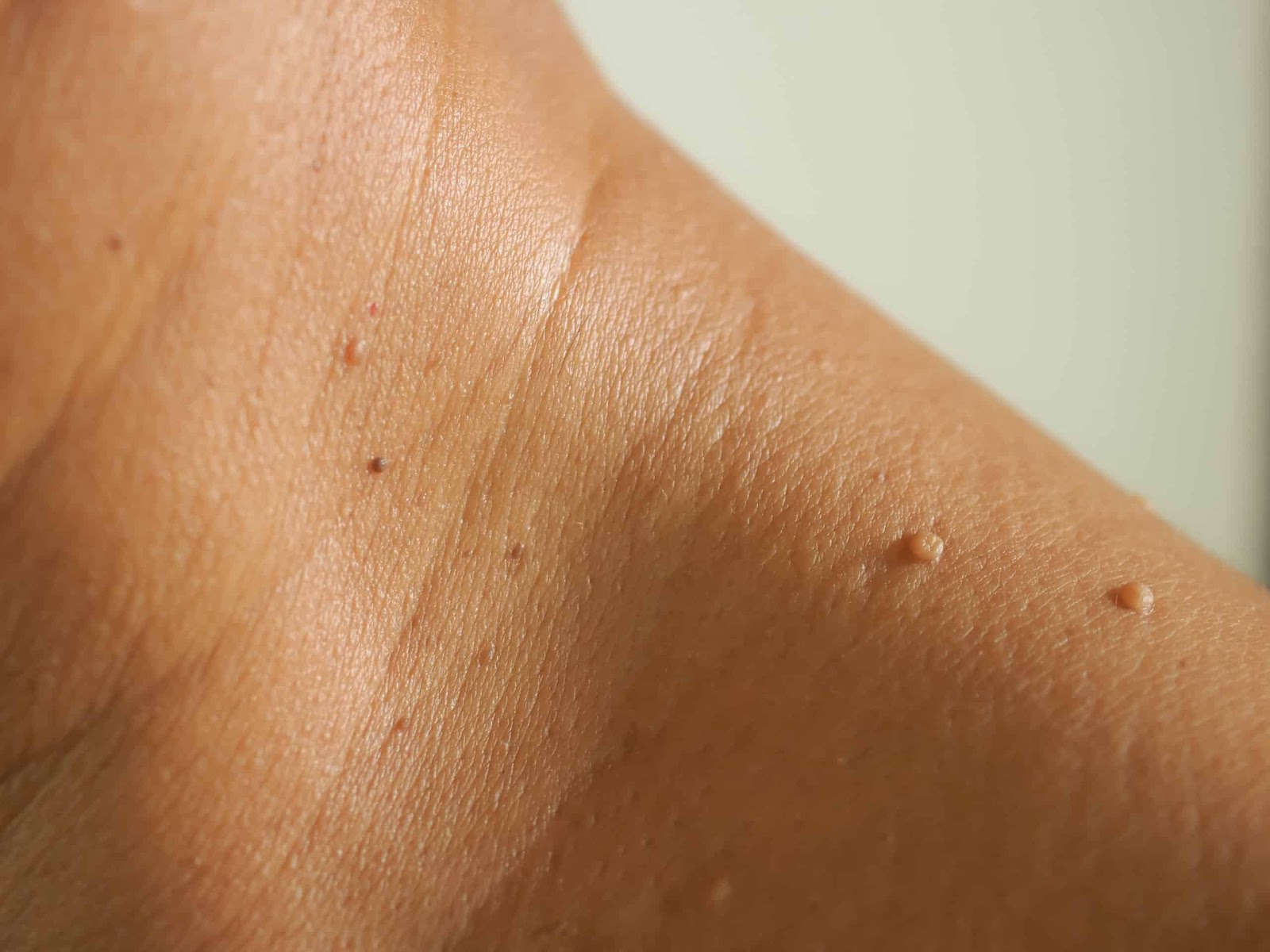Genital warts and skin tags are two common skin conditions that can appear similar and often be confused with each other, but they have distinct features.
Understanding the differences between these two conditions is crucial for effective and accurate diagnosis and treatment. Misidentifying genital warts as skin tags—or vice versa—can lead to inappropriate treatment and potential health risks.
What are Genital Warts?
Genital warts are a common sexually transmitted infection that manifests as small, flesh-coloured, or grey growths in the genital area or around the anus. HPV warts is caused by the HPV virus and is highly contagious. These growths may appear individually or in clusters.
Genital warts are a type of sexually transmitted disease caused by human papillomavirus. They are fleshy growths with a cauliflower like texture that appear commonly on the genital regions or the surrounding skin like anogenital warts.
What are Skin Tags?

Skin tags, also known as acrochordons, are small skin growths that protrude from the skin. They are harmless growths and are typically benign and have a clear, fleshy appearance. These are usually noncancerous growths.
Skin tags develop in areas where skin rubs on skin or clothing, such as the neck, armpits, and under the breasts. While generally harmless and painless, some individuals may choose to remove them for cosmetic reasons or if they become irritated.
Causes
Causes of Genital Warts
Genital warts are caused by specific strains of the human papillomavirus (HPV), a sexually transmitted infection. HPV infects the skin and mucous membranes, leading to the development of warts in the genital area.
Genital warts are primarily spread from an infected person through:
Vaginal, anal, or oral sex
Skin-to-skin contact with the genital area
Sharing sex toys
It’s possible to transmit HPV even when no warts are visible, as the virus may be present in the genital area without causing symptoms.
Risk factors for contracting genital warts include:
Having multiple sexual partners
Engaging in unprotected sex
Having a weakened immune system (e.g., HIV infection or immunosuppressant medications)
Being uncircumcised (for men)
Causes of Skin Tags
Skin tags, or acrochordons, are benign growths that typically form in areas of the skin where there is friction or irritation. Common sites include under the arms, around the neck, under the breasts, and in the groin area.
Skin tags are non-contagious, meaning they cannot be transmitted through physical contact with another person. They are simply a result of skin changes and irritation rather than an infectious process.
Factors that may increase the likelihood of developing skin tags include:
Obesity: Excess weight can lead to more skin folds, increasing friction and the likelihood of skin tag formation.
Diabetes: Individuals with diabetes may be more prone to skin tags due to insulin resistance and hormonal changes.
Genetics: A family history of skin tags may increase the risk, suggesting a genetic component to their development.
Hormonal Changes: Hormonal fluctuations, especially during pregnancy, can lead to an increase in skin tags.
Age: Skin tags are usually more common in older adults as skin elasticity decreases with age.
Symptoms
Symptoms of Genital Warts

Symptoms of genital warts include:
Itching or mild pain in the genital area
Dampness near the warts
Vaginal discharge (in women)
Genital warts typically appear in the following areas:
Vulva, vagina, cervix (in women)
Penis, scrotum (in men)
Anus (in both men and women)
Mouth or throat (following oral sex)
Symptoms of Skin Tags
Skin tags resemble deflated balloons or grains of rice and are usually attached to the skin via a thin stalk (peduncle). They are usually asymptomatic and are most commonly found in areas such as:
Neck
Armpits
Face
Under the breasts
Groin
Other areas prone to skin folds and friction
Diagnosis
Diagnosing Genital Warts
Genital warts can be diagnosed through visual inspection and physical exam by a healthcare professional.
In some cases, HPV tests may be performed to identify any high-risk HPV strains, particularly those associated with cervical cancer in women.
Diagnosing Skin Tags
Skin tags are benign growths that can often be diagnosed through visual inspection alone. A healthcare provider will evaluate the appearance and location of the growth.
Additional tests are generally only necessary if there is uncertainty about the diagnosis.
Treatment
Treatment Options for Genital Warts
There are several options to treat genital warts, depending on the size, location, and number of warts, as well as patient preference.
Topical Treatments: Creams or solutions containing podofilox or imiquimod are applied directly to the warts.
Cryotherapy: Freezes the warts with liquid nitrogen, causing them to eventually fall off.
Surgical Removal: Involves excising the warts or using laser therapy to remove them, especially in larger or more persistent cases.
Treatment Options for Skin Tags
Skin tags are generally harmless and may not require treatment unless they cause discomfort or are cosmetically undesirable. Available methods for treating skin tags include:
Cryotherapy: Freezes the skin tag with liquid nitrogen, leading to its eventual removal. It is quick and effective for many patients.
Ligation: Tying off the skin tag to cut off its blood supply, resulting in its eventual detachment. This can be done at home or in a healthcare setting.
Surgical Removal: The skin tag is cut off with a scalpel, usually in a healthcare provider’s office. Laser removal may also be used, especially for larger or multiple tags.
Prevention
Preventing Genital Warts
Preventing genital warts primarily involves reducing the risk of HPV infection. Here are some effective preventive measures:
HPV Vaccination: Vaccination can prevent the strains of HPV that cause genital warts and certain cancers.
Practice Safe Sex: Use condoms during sexual contact to reduce the risk of HPV transmission, though condoms do not provide complete protection.
Limit Sexual Partners: Limiting the number of sexual partners can decrease the risk of HPV exposure.
Regular Health Check-ups: Routine check-ups with a healthcare provider can help in the early detection and management of genital warts.
Avoid Skin-to-Skin Contact: Avoid intimate contact with individuals who have visible genital warts.
Preventing Skin Tags
While skin tags are generally harmless, certain preventive measures can reduce the likelihood of their formation:
Reduce Skin Friction: Wear loose-fitting clothing to minimise friction in areas prone to skin tags, such as the neck, armpits, and groin.
Maintain a Healthy Weight: Achieving and maintaining a healthy weight can reduce skin folds and friction, lowering the risk of skin tags.
Manage Diabetes: Control blood sugar levels if you have diabetes, as this can reduce the risk of skin tags.
Avoid Skin Irritation: Be mindful of skin irritation from jewellery, clothing, or other sources that may cause friction.
Regular Skin Checks: Monitor for any new growths and consult your healthcare provider if you notice changes.
Potential Complications
Complications of Genital Warts
Although genital warts are not life-threatening, leaving them untreated can lead to certain complications:
Spread to Other Areas: Untreated warts can spread to other parts of the genital area or within the body.
Transmission to Partners: Untreated warts increase the risk of transmitting HPV to sexual partners.
Recurrence: Even after treatment, genital warts may recur due to the persistent nature of HPV.
Rare Cancer Risk: While the HPV strains that cause genital warts are different from those that cause cervical cancer, there is a small risk of developing precancerous changes in the genital area.
Complications of Skin Tags
Skin tags are generally harmless, but in some cases, they may lead to minor complications such as:
Irritation and Inflammation: Skin tags can become irritated or inflamed if they are constantly rubbed by clothing or jewellery.
Bleeding and Infection: Skin tags may bleed if snagged or torn, and an infection can develop if the area is not kept clean.
Emotional and Psychological Impact
Receiving a diagnosis of genital warts or skin tags can be a challenging experience, both physically and emotionally. Acknowledging the potential impact on mental health and seeking support when needed is important.
Educate yourself: Learn about your condition, treatment options, and prevention strategies to feel more in control.
Communicate with your healthcare provider: Ask questions, express concerns, and work together to develop a treatment plan.
Talk to a mental health professional: If you are struggling with the emotional impact of your diagnosis, don’t hesitate to seek professional help. Counsellors or therapists can help you process your feelings and develop healthy coping mechanisms.
Seek support: Talk to friends or family members, or consider joining a support group to connect with others experiencing similar challenges. They can provide a sense of community and reduce feelings of isolation.
Utilise online resources: Many organisations offer online support forums, educational materials, and resources for individuals living with genital warts or skin tags.
Conclusion
This article has outlined the key aspects of genital warts and skin tags, including their causes, symptoms, diagnostic methods, treatment options, prevention strategies, and potential complications. Understanding these conditions is crucial for effective management and self-care.
Genital warts are caused by specific strains of HPV, while skin tags are benign growths often resulting from friction.
Diagnosis of genital warts and skin tags are typically evaluated through visual inspection by an experienced doctor. Your doctor may recommend additional HPV test if you have genital hpv infection.
Preventive measures for genital warts include HPV vaccination and safe sexual practices, whereas skin tag prevention focuses on reducing skin friction and maintaining a healthy weight.
Both conditions can have an emotional impact, necessitating support and education.
Aspect | Genital Warts | Skin Tags |
|---|---|---|
Cause | Human Papillomavirus (HPV) | Skin friction, genetics, and weight |
Appearance | Warty growths in genital areas | Soft, raised growths on the skin |
Diagnosis | HPV test and visual inspection | Primarily visual inspection |
Treatment | Various options, including cryotherapy | Often not required but can be removed |
Complications | Spread, recurrence, rare cancer risk | Irritation, bleeding, and infection risk |
Prevention | HPV vaccination, safe sexual practices | Reduce friction and maintain a healthy weight |
If you notice any changes in your skin or suspect you may have genital warts, it is important to consult a healthcare professional for proper diagnosis and treatment. Remember, early detection and appropriate management can greatly improve outcomes and reduce the risk of complications.









